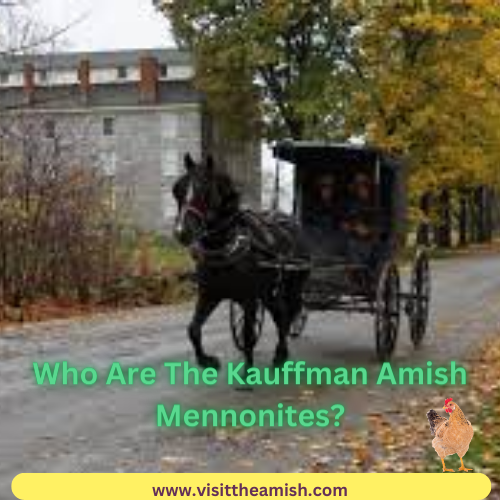The Kauffman Amish Mennonites are a subgroup of the Mennonite faith that have their roots in the teachings of Christian N. Kauffman, a bishop who lived in the late 19th and early 20th centuries. They are also known as “Kauffman Amish” or “Kauffman Mennonites.”
The Kauffman Amish Mennonites share many beliefs and practices with other Mennonite groups, including a commitment to nonviolence, simplicity, and humility. They also reject certain modern conveniences, such as televisions and the internet, and place a strong emphasis on community and family.
However, the Kauffman Amish Mennonites have some distinct differences from other Mennonite groups. Perhaps the most notable is their adherence to a stricter interpretation of the Bible and the teachings of Jesus Christ. They believe that the Bible should be taken literally and that Christians should live according to the teachings and example of Jesus as closely as possible.
As a result of this, the Kauffman Amish Mennonites are often more conservative in their practices and beliefs than other Mennonite groups. They reject many modern technologies and conveniences, such as cars, telephones, and electricity. They also dress more plainly, often wearing traditional Amish clothing and avoiding flashy or bright colors.
In terms of worship, the Kauffman Amish Mennonites typically hold services in homes or small churches, and they often sing hymns and worship in German. They also place a strong emphasis on adult baptism, which is seen as a sign of commitment to the faith.
The Kauffman Amish Mennonites are a small but distinct subgroup of the Mennonite faith, with settlements primarily in the United States, particularly in the Midwest and Mid-Atlantic regions. They are known for their conservative practices and beliefs and their strong commitment to living according to the teachings of Jesus Christ.
It’s worth noting that Kauffman Amish Mennonites are not to be confused with the Old Order Amish or New Order Amish, even though their lifestyle and practices have some similarities. They are a separate group of Mennonites with their own set of beliefs and practices that are rooted on the teachings of Christian N. Kauffman.
Despite their small size, the Kauffman Amish Mennonites have a strong sense of community and continue to adhere to their traditional beliefs and practices. They are committed to living a simple and humble life, guided by their interpretation of the Bible and the teachings of Jesus Christ. As a result, they are often seen as a model of traditional Christian living and a reminder of the importance of simplicity, humility, and community.
In terms of education, the Kauffman Amish Mennonites typically only receive an 8th grade education and prioritize practical skills and vocational training over higher education. They also have their own parochial schools, which teach basic subjects such as reading, writing, and math, as well as traditional skills such as farming and homemaking.
In terms of work, many Kauffman Amish Mennonites are farmers, but they also work in traditional trades such as carpentry and blacksmithing. They also have a strong tradition of self-sufficiency and often produce their own food, clothing, and other necessities.
The Kauffman Amish Mennonites have a strong commitment to nonviolence, and they do not participate in military service or engage in political activism. They also have a strong tradition of aid to the poor and often provide assistance to those in need within their communities.
Even though the Kauffman Amish Mennonites live a simple and traditional lifestyle, they are not isolated from the outside world. They do interact with non-Amish people, and participate in economic activities such as selling goods and services to the non-Amish communities.
In summary, the Kauffman Amish Mennonites are a subgroup of the Mennonite faith known for their conservative practices and beliefs, their strong sense of community, and their commitment to traditional values. They reject many forms of modern technology and conveniences, prioritize practical skills and vocational training, and have a strong tradition of self-sufficiency. They are a small but distinct group that continues to adhere to their traditional beliefs and practices, guided by the teachings of Christian N. Kauffman.

